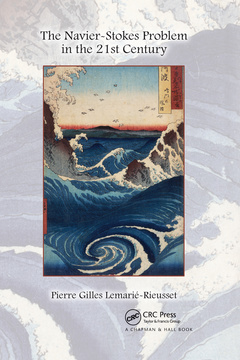The Navier-Stokes Problem in the 21st Century
Auteur : Lemarie-Rieusset Pierre Gilles

Up-to-Date Coverage of the Navier?Stokes Equation from an Expert in Harmonic Analysis
The complete resolution of the Navier?Stokes equation?one of the Clay Millennium Prize Problems?remains an important open challenge in partial differential equations (PDEs) research despite substantial studies on turbulence and three-dimensional fluids. The Navier?Stokes Problem in the 21st Century provides a self-contained guide to the role of harmonic analysis in the PDEs of fluid mechanics.
The book focuses on incompressible deterministic Navier?Stokes equations in the case of a fluid filling the whole space. It explores the meaning of the equations, open problems, and recent progress. It includes classical results on local existence and studies criterion for regularity or uniqueness of solutions. The book also incorporates historical references to the (pre)history of the equations as well as recent references that highlight active mathematical research in the field.
Presentation of the Clay Millennium Prizes. The physical meaning of the Navier–Stokes equations. History of the equation. Classical solutions. A capacitary approach of the Navier–Stokes integral equations. The differential and the integral Navier–Stokes equations. Mild solutions in Lebesgue or Sobolev spaces. Mild solutions in Besov or Morrey spaces. The space BMO-1 and the Koch and Tataru theorem. Special examples of solutions. Blow up? Leray's weak solutions. Partial regularity results for weak solutions. A theory of uniformly locally L2 solutions. The L3 theory of suitable solutions. Self-similarity and the Leray–Schauder principle. α-models. Other approximations of the Navier–Stokes equations. Artificial compressibility. Conclusion. Notations and glossary. Bibliography. Index.
Pierre Gilles Lemarié-Rieusset is a professor at the University of Evry Val d’Essonne. Dr. Lemarié-Rieusset has constructed many widely used bases, such as the Meyer-Lemarié wavelet basis and the Battle-Lemarié spline wavelet basis. His current research focuses on the application of harmonic analysis to the study of nonlinear PDEs in fluid mechanics. He is the author or coauthor of several books, including Recent Developments in the Navier-Stokes Problem.
Date de parution : 09-2020
15.6x23.4 cm
Disponible chez l'éditeur (délai d'approvisionnement : 14 jours).
Prix indicatif 50,12 €
Ajouter au panierDate de parution : 03-2016
15.6x23.4 cm
Disponible chez l'éditeur (délai d'approvisionnement : 15 jours).
Prix indicatif 117,69 €
Ajouter au panierThèmes de The Navier-Stokes Problem in the 21st Century :
Mots-clés :
BMO Space; Navier Stokes Equations; Clay Millennium Prize Problems; Distribution Vector Field; Harmonic Analysis; Global Mild Solution; partial differential equations; BMO; fluid mechanics; Besov Space; Morrey spaces; Weak Solutions; Caffarelli; Kohn; and Nirenberg; Mild Solutions; capacitary theory; Navier Stokes Solutions; Navier–Stokes equations; Divergence Free Vector Field; Leray's weak solutions; Kinematic Pressure; Pierre Gilles; Navier Stokes Problem; Lemarié Rieusset; Oseen Tensor; Banach Space; Cauchy Problem; Clay Mathematics Institute; Global Weak Solutions; Riemann Hypothesis; Millennium Prize; Millennium Prize Problems; Energy Inequality; Inter-molecular Forces; Clay Millennium; Imu; Force Density



